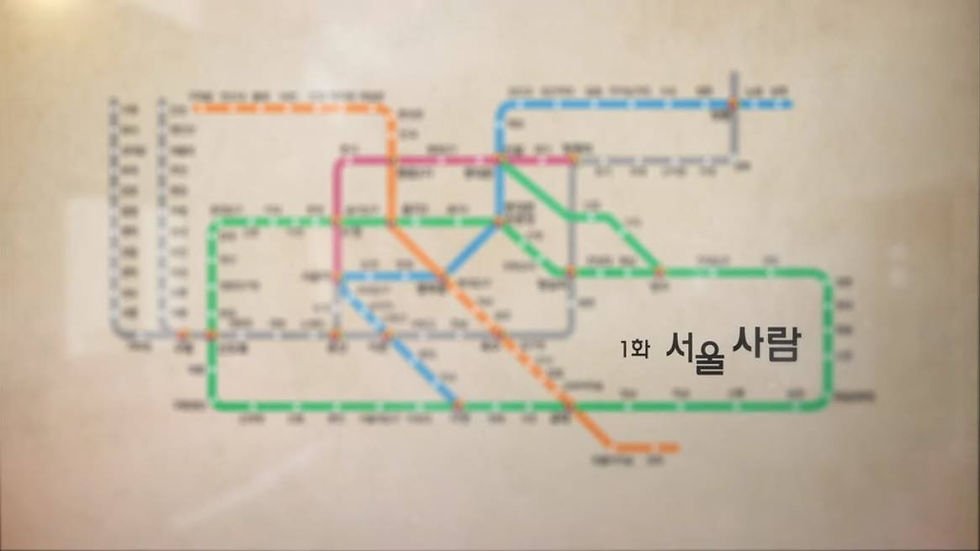
Episode 1: Seoul Person
By Junsoo Kim
The first episode of Reply 1994 starts with the introduction of Sinchon Hasuk, a lodging place for university students. Seong Dongil and Yi Ilhwa, the owners, moved to Seoul from Masan (now incorporated as Changwon) just a month ago with their daughter Najeong. Najeong, a big fan of basketball superstar Yi Sangmin, keeps an intimate relationship with “Sseuregi” whom the family calls “our son”. There are two students living with the Seong Family at this moment, “Haetae” and Jo Yunjin, both from Jeollanam-do. “Samcheonpo” from Samcheonpo (now called Sacheon) joins Sinchon Hasuk after a chaotic experience with public transportation in Seoul.
At the end of this episode, Najeong says “we became Seoul citizens, but we weren’t Seoul people yet” (Ep 1, 58:50 - 58:58). There are many other similar lines like this in the episode, but this narration can definitely show that Episode 1 of Reply 1994 shows inherent regionalism in South Korea. It shows how people are not “Seoul people” just because they live in Seoul. However, I would like to argue that this regionalism is more so the feeling of inferiority by those not from Seoul.

First, people feel they are doing something wrong in Seoul, but they also feel the ones supposedly practicing “right” thing are too selfish. For example, When Ilhwa yells to them saying “this is not Masan, you guys should not do that” (ep 1, 27:50-28:30). Ilhwa speaks as if something they did Masan is wrong. When a neighbor complains about the noise, both Dongil and Ilhwa say that people in Seoul are too mean. Second, people are trying to assimilate to whatever people in Seoul do. Such assimilation is appreciated among those not from Seoul. For instance, Samcheonpo proudly tries not to use his heavy dialect when buying subway ticket, but the clerk instantly knows he is not from Seoul. Another case would be when Yunjin praises Najeong that she totally became a “Seoul person” as Najeong knows traffic in Seoul very well.

These circumstances can be linked to some previous lectures. For example, according to the lecture on the Geography of Korea, southern regions in Korea – Yeongnam and Honam – are prevented from communicating to other regions by mountain ranges. These mountain ranges do not just block the two provinces, but also metropolitan Seoul; the disparity between Seoul and other regions will thus exist. Moreover, economic inequality through uneven development makes people feel “deprived of socioeconomic opportunity” (Kang 2003, 89). Considering Seoul is the capital of everything in South Korea, all the other regions inevitably have been developed less than Seoul. Also, the lecture on family mentioned that people in rural areas tend to live with relatives in the same village; under this circumstance, not many people outside Seoul would have experience with Seoul. Therefore, Seoul must have been the city which people from other regions look up to while people feel where they are from isn’t as great. Consequently, the regionalist feelings expressed in the first episode of Reply 1994 really was the sense of inferiority for those who did not have any experience with Seoul before.
With these in mind, I would like to ask the following questions:
-
Why would people from different regions of Korea feel that those in Seoul are selfish and mean? (there is even a term called “Seoul Kkakjaengi” to describe those “mean” people of Seoul!) What are different behaviors practiced in Seoul or big metropolis?
-
Regional disparity is still pretty big in Korea. For example, everyone tries to come to Seoul for good education just like the characters of this drama did. How would you ameliorate such problem?
Bibliography:
Kang, Myung-goo. "Decentralization and the Restructuring of Regionalism in Korea." Korea Journal 43, no. 2 (2003): 81-108.